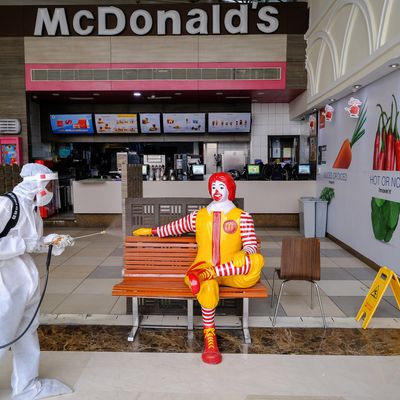
Walmart really cares about black lives. So does Amazon. And McDonald’s. Six years after Ferguson, the killing of George Floyd has shocked their consciences. They’ve said so repeatedly, in missives to staff and ads and a few policy changes here and there. Walmart and the Walmart Foundation “are committing $100 million over five years through a new center on racial equity,” CEO Doug McMillon announced in a letter to employees. Jay Carney, a senior vice-president at Amazon, tweeted a photo of himself in a Black Lives Matter shirt at a protest. On Instagram, his boss, Jeff Bezos, posted an exchange he’d had with a racist customer. “This sort of hate shouldn’t be allowed to hide in the shadows,” Bezos wrote.
Not to be outdone, McDonald’s announced that it will give money to the NAACP and the National Urban League. It has also produced a new digital ad to honor victims of police brutality. Their names appear in black on a field of McDonald’s yellow. “We see them in our customers,” it says. “We see them in our crew.” At the end, the Golden Arches briefly flash onscr een.
But Terrence Wise was not impressed. “It’s like someone looking me in the face and telling me a bold lie,” the McDonald’s worker said. “That’s the clearest way I can put it.” Wise, an activist with the Fight for $15 and a Union campaign, has spent the last seven years lobbying McDonald’s for better wages and benefits like sick leave. “I’ve marched to the doorstep of the McDonald’s headquarters in Chicago, year after year, demanding not only racial equality but $15 an hour and a union,” he added. “McDonald’s has shown through their actions just how much black and brown lives matter to them. They’ve not given us a living wage. They’ve been a part of the problem.”
The discrepancy between a company’s behavior and the promises it makes in its press releases isn’t new. Nor is the problem limited to big corporations. But as the COVID-19 pandemic continues to sicken and kill front-line workers, corporate hypocrisy has public life-or-death stakes. In the weeks leading up to the protest wave, workers for companies like McDonald’s and Amazon staged several demonstrations of their own. Their negligent employers put them in danger, they said. They didn’t have enough masks, enough sick leave, enough space to social distance. And they were getting sick.
After months of mounting COVID cases — and years of activism — workers like Wise say it’s difficult to believe their employers truly care about black lives. In one Oakland McDonald’s, managers told cashiers and cooks to wear dog diapers if they couldn’t find masks on their own. Eleven workers eventually tested positive for the virus; one of them is pregnant. The virus then spread to their family members, and beyond them, to other McDonald’s workers. After an Oakland worker took a shift at a restaurant in Berkeley, seven more workers tested positive for the virus. If McDonald’s wants its workers to believe it cares about racial justice, “they need to start by opening the dialogue between themselves and us workers, and by listening to us,” said Angely Rodriguez Lambert, who has COVID-19. “We demanded more than three times to talk to our employers, but we have yet to hear back. We’ve been ignored.” Lambert is still on strike, along with 32 of her co-workers in Oakland. A dozen Berkeley workers have joined them. They are all people of color, a representative for Fight for $15 told Intelligencer.
In other cases, open acts of retribution undermine a corporation’s commitment to black lives. Amazon fired Chris Smalls, who is black, hours after he led a walkout on Staten Island. Days later, Vice reported that Amazon’s general counsel, David Zapolsky, had smeared Smalls in a memo to top executives. “He’s not smart, or articulate, and to the extent the press wants to focus on us versus him, we will be in a much stronger PR position than simply explaining for the umpteenth time how we’re trying to protect workers,” he wrote. Smalls is out of a job, but Zapolsky is still employed. Recode has reported that he recently emailed a special Black Lives Matter missive to the company’s legal staff. He is “reading and listening to many voices responding to this most recent spate of racial injustice,” he wrote. He did not mention his comments about Smalls.
“I left Amazon because my safety wasn’t taken seriously,” said Mario Crippen, who led a walkout at a warehouse in Romulus, Michigan, in early April. Amazon’s handling of the coronavirus was the last indignity that Crippen, an activist involved with the Athena coalition of advocacy groups, could tolerate. He told Intelligencer that he also got racially profiled at work. For a while, he was the only black process assistant in his facility’s pick department. But after a white manager asked him to shoulder extra responsibilities on top of his regular job, human resources warned him that his work had begun to suffer. He could either go on a performance-review plan, which he said would require him to file a report about his work every hour on the hour, or he could step down. He chose the latter, even though it was a demotion that came with a pay cut.
On the phone, Crippen observed that Amazon’s corporate leadership is overwhelmingly white, and so were the managers of his former warehouse. “I was the only black process assistant in that whole department. Nobody else. It was just shocking to me. There was nobody else black in a position of power at this job. So I really felt accomplished, and I really felt like I had shown my worth,” he said.
“I want to see more people of color in power at Amazon,” he added.
There are other material changes workers say their employers could make. Cat Davis, a Walmart associate who previously spoke to Intelligencer about her activism with United for Respect, said the company’s $100 million commitment “is a lot of money to donate.” Associates, however, are still struggling to cope with the combined burdens of a pandemic and working conditions that associates like Davis have protested for years.
“There are many associates, especially black and brown associates, who are still begging for hours,” she pointed out. Irregular scheduling means irregular pay, which leaves workers uniquely vulnerable with the coronavirus still active. “Blacks have been dying [from the virus] more than any other group, and it’s due to underlying health issues,” she added. “And the reason why they have underlying health issues is because many just cannot afford to go to a doctor.” Walmart isn’t doing much to improve their lives, she added. UFR activists like Davis have long demanded more comprehensive action from the company on racial and gender discrimination, in addition to higher pay, a more equitable sick-leave policy, and regular hours at work.
“It’s never too late to be part of the solution,” Wise said of McDonald’s. “Give workers $15 and a union. To work for a company like that, it would make me proud. I’d love to represent a brand that is truly for America and truly for black and brown folks.”






























